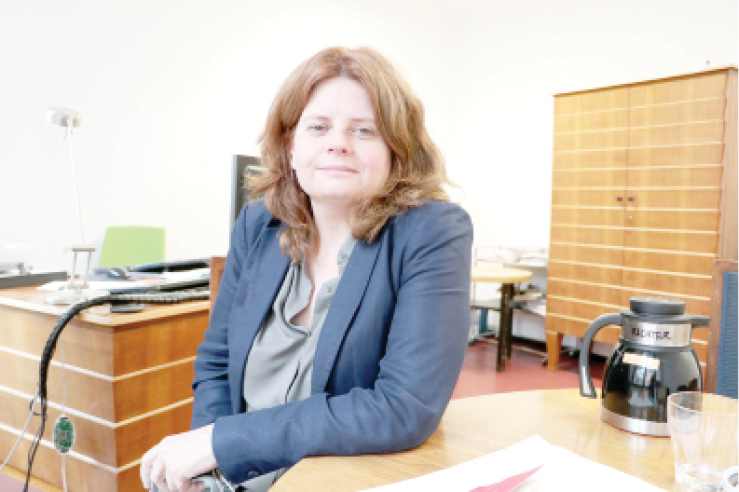The stolen Benin bronzes have become a symbol for the discourse of the Colonial era in ethnological museums in Europe. Léontine Meijer-van Mensch, the new director of the State Ethnographical Collections of Saxony and director of the museum for Ethnology in Leipzig and Dresden, talks about restitution and lending, struggles in the international museum association (ICOM) and how more than 200 Benin Bronzes were labelled as cultural heritage of Saxony. The Dutchwoman was previously program director of the Jewish Museum Berlin.
In July, the Benin Dialogue Group visited Nigeria to talk about the Benin bronzes that were looted from Benin City in 1897 and of which about 240 are in the museums in Leipzig and Dresden today. How was the meeting?
It was a very successful meeting. Unfortunately, I was not there. I was sick. As a substitute was Africa custodian of the State Ethnographic Collections Saxony, Silvia Dolz, in Benin City. It was all about the new museum being built in Benin City for the Benin Bronzes and the exhibition to be shown there. The local talks involved loans for the new museum, which of course did not affect the claim to restitution. This may seem like a slowdown or prevention tactic, but for me it is a start: all 13 museum houses belonging to the Benin Dialogue Group are committed to loans. To come to this common denominator, it took several years. Saxony is also willing to make Benin objects available on loan for the new exhibition, including the very valuable pieces that can be seen in the Leipzig Museum today.
How does the state of Saxony act in terms of restitution of Benin bronzes?
I have a lot to do with Eva-Maria Stange, Minister of State for Science and the Arts in the Free State of Saxony. She is aware of the problems of ethnographic museums. And I am very fond of her commitment and the responsibility she assumes, for example in the return of human bones. As far as the Benin bronzes are concerned, we are still in a process of identification. If you like, Saxony is currently in the middle of a European scale. The two extremes are the Dutch museums, which are ready to give back immediately, and the British Museum in London, which rather wants to keep them.
How does it come, that Saxony declared the Bronzes as Saxony´s cultural heritage?
In the 2002 purchase it was important, that these objects stay accessible to the public in Saxony in the long term. Publications also speak of “treasures of world culture”. De jure we have, perhaps, more to speak of Saxony´s “cultural ownership”. Many of the Benin Bronzes were only on loan in our collection, they were owned by the heirs of the collector Meyer. These were then bought by the State of Saxony with the support of some cultural foundations to preserve them for the collection. Saxony acquired these objects, so that the objects do not end up in the international art market. At the time, that was considered best.
Is it not a bit odd that looted objects are classified as Saxony´s cultural heritage?
The idea of a Saxony´s heritage is exciting in the way, that the Benin Bronzes and their way and how they have come to where they are today is also a part of Saxony´s history. So, can they become a Saxony`s cultural heritage on this way? I think yes and no. They tell a lot about global connections and why we should not accept that besides “Hellerau” or “August the Strong” also Benin Bronzes can tell something about Saxony. In this context I think much more globally, perhaps a little more universalist in terms of the concept of culture. On the other hand, of course, it remains Nigerian heritage. This is also reflected in some voices from Nigeria who say that these objects can be cultural ambassadors in other countries.
For many Nigerians, it seems rather arrogant, derogatory and insulting that their cultural heritage has not been returned for so many decades.
There is a field of tension. The fact remains, of course, that it is unfair that 90 to 95 percent of the African cultural heritage is in Europe today and hardly anything in Africa. This reflects the asymmetrical power relationship since the colonial era. Here I also see my responsibility as a museum director in the now slowly beginning process of change. The fact that the German Federal Government has established the German Cultural Heritage Centre in Magdeburg, which has also been dealing with colonial history and that the ethnological museums have worked out a common position paper is part of this positive process.
You are a member of the Executive Council of the International Council of Museums ICOM. What position does the association take on the restitution debate?
As always with a world association it is difficult to come to a common denominator. At ICOM, however, colonialism is increasingly on the agenda. ICOM is also working on a new definition of a museum, which, for example, states that everyone has the right to their own cultural heritage. This is a central and sensitive point. Some national ICOM committees of European states are lobbying strongly against this new definition.
For many years, the museums have violated the statute of their own world association. Since 2006 there is that paragraph, that objects have to be returned, which ended up by using force in museums …
Right. But if you read carefully, there is the word “should”, a subjunctive. And the statute also has no legal force, but serves as an orientation.
Decades ago, ICOM had asked all its members to return Benin Bronzes. Not a single museum followed this call. And even the current ICOM statute seems to be a printed Sunday speech rather than an engine on this point.
It is really not so. Behind the scenes, things get tough. I hope that the already mentioned new definition, or rather vision does not split the association. Personally, I find it very difficult and frustrating that many, especially European museum colleagues, are still reluctant to do so. The actors that drive this process come almost exclusively from the global south. The north is having a hard time giving up power. And that’s what it’s all about: loss of power.
Yusuf Tuggar, the ambassador of Nigeria in Berlin, recently demanded in a speech the return of looted cultural goods and the Benin Bronzes from German museums. He also spoke clearly about the ownership issue, which is being pounded around so much in Europe, probably because the Bronzes are worth hundreds of millions of Euros …
My colleague Silvia Dolz was a guest at the Nigerian Cultural Festival in Berlin and heard the speech. I think it’s very good that an ambassador positions himself that way. We are in contact with the embassy, because if it comes on loan from Benin bronzes, then everything must be discussed. It’s about a loan for three years.
You worked for two years as program director at the Jewish Museum in Berlin. Is it conceivable that Jewish heirs would be offered a “loan” of objects that were so clearly and brutally stolen from their families?
That happens even. It’s not always that easy. Sometimes there are also questions about the rightful heirs or if they are still alive.
These questions do not arise with the Benin Bronzes. The case is clear. The royal palaces and dignitaries of the kingdom were stigmatized and thousands killed as the little kingdom stood in the way of British colonial interests. For a century, the royal palace in Benin City has demanded the plundered objects back …
In any case, this question has an ethical component, and on the other hand, though difficult to convey from this ethical issue, there is a legal one. Then there are also questions like, should the objects be returned to the king, the state or the federal government?
Nigeria has been speaking with one voice for years. Edo State and the Nigerian federal government see the king of Benin as the rightful owne. The Jewish community would probably cry out in such a clear case of injustice and could appeal to Washington’s principles.
There is an outcry of African communities, even if they are perhaps not so present in the media and not as influential as the Jewish victims’ associations. But you open open doors with your arguments: Yes, we also need some kind of Washington principles and a Limbach commission for the colonial legacy. Then we would get away from the rhetoric and have concrete tools and places to turn to. But there is one thing that needs to be clarified on this point: even though some things have been achieved regarding the return of stolen Jewish art treasures, there are still many museums that do not make any effort at all. As far as the Benin Bronzes are concerned, I think Germany will sooner or later return. I’m sure.
Ethnological museums themselves were deeply involved in colonial objectives and promoted poisoned propaganda whose false images of other continents and peoples are still virulent. How will you, as the new director of the Ethnographic Collections of Saxony, handle this difficult legacy?
I would like to address that in a dialogical and open way. I would like to organize the exhibition more thematically and less geographically, and the own institutional history and restitution are two important topics for me. And this topic can be illustrated, for example, in close cooperation using the example of the Benin Bronzes. You will see and hear about it in our exhibitions and events.
Source: lvz.de

 Join Daily Trust WhatsApp Community For Quick Access To News and Happenings Around You.
Join Daily Trust WhatsApp Community For Quick Access To News and Happenings Around You.


